NOWSA, or the Network of Women Students Australia, holds a conference every year dedicated to women’s activism. More than 160 students from across Australia gathered last month for its national conference in Perth, making it the biggest NOWSA conference in many years.
The weeklong event from July 14 to 18 took place at Edith Cowan University. It featured a range of workshops and speakers, who focused on issues relating to racism, trans rights and sex worker rights.
-
-
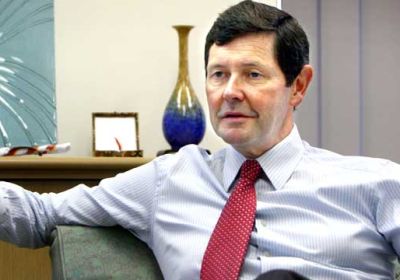 Victoria police are vetting registrants and scouting venues to try to provide security for the besieged World Congress of Families in Melbourne on August 30. The final venue for the event remains unclear as they try to avoid clashes with widespread community opposition. Activists are already causing chaos for conference organisers Babette Francis of the Endeavour Forum (formerly Women Who Want to be Women) and John Brennan of the conservative Catholic men’s group Knights of the Southern Cross.
Victoria police are vetting registrants and scouting venues to try to provide security for the besieged World Congress of Families in Melbourne on August 30. The final venue for the event remains unclear as they try to avoid clashes with widespread community opposition. Activists are already causing chaos for conference organisers Babette Francis of the Endeavour Forum (formerly Women Who Want to be Women) and John Brennan of the conservative Catholic men’s group Knights of the Southern Cross. -
The Students for Women Only Services Group held a vigil in Sydney on July 24 to protest against the recent decision to defund specialist women’s and children’s refuge centres in NSW. The vigil was attended by about 300 people. Speakers included Asian Australian Alliance convener Daphne Lowe Kelley, United Muslim Women Association CEO Maha Abdo, NSW Greens MLC Mehreen Faruqi and Labor MLC Sophie Cotsis.
-
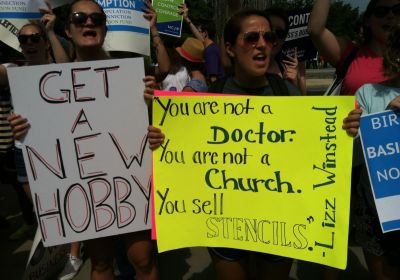 Everyone should be concerned about the June 30 US Supreme Court’s ruling in favour of retail arts and crafts company Hobby Lobby. Along with two other family-owned firms, it sued the federal government, saying they should not have to pay for health insurance plans covering four contraceptives to which they object on religious grounds. The decision represents an expansion of corporations’ rights at the expense of workers, health care provision and women’s reproductive health choice — all in the name of protecting religious freedom.
Everyone should be concerned about the June 30 US Supreme Court’s ruling in favour of retail arts and crafts company Hobby Lobby. Along with two other family-owned firms, it sued the federal government, saying they should not have to pay for health insurance plans covering four contraceptives to which they object on religious grounds. The decision represents an expansion of corporations’ rights at the expense of workers, health care provision and women’s reproductive health choice — all in the name of protecting religious freedom. -
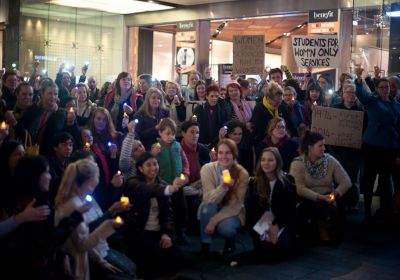 The Feminist Collective and newly-formed group the No Shelter Collective held a meeting at the Newtown Neighbourhood Centre on July 16 to address the NSW state government’s plans to defund key women and children’s refuges across the state. About 130 people came to hear about government plans to defund around 80 specialist refuges, which could potentially force many women and children’s refuges to shut down, or be handed over to be run by private organisations. Many women’s refuges have already been shut down or are under the process of being handed over.
The Feminist Collective and newly-formed group the No Shelter Collective held a meeting at the Newtown Neighbourhood Centre on July 16 to address the NSW state government’s plans to defund key women and children’s refuges across the state. About 130 people came to hear about government plans to defund around 80 specialist refuges, which could potentially force many women and children’s refuges to shut down, or be handed over to be run by private organisations. Many women’s refuges have already been shut down or are under the process of being handed over. -
Students for Women’s Only Services released this statement on July 14. *** Candles, as well as petitions, will be given out at a Sydney rally to shine a light on the statewide closure of independent women’s homelessness services. University students have organised the vigil for July 24 in Pitt St Mall at 5.30pm and hope to gain the attention and signatures of late-night shoppers.
-
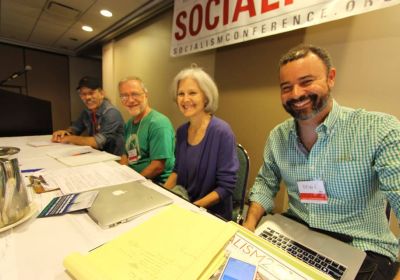 New red-green electoral alliances, a turn to ecosocialism and a deepening of the US International Socialist Organization's rethink on feminism were key features of its well-attended Socialism 2014 conference in Chicago. The gap between rich and poor in the US is large and growing. It has sparked a popular campaign for a minimum wage of US$15 an hour for low-paid workers, and in defence of jobs of teachers and other social service providers.
New red-green electoral alliances, a turn to ecosocialism and a deepening of the US International Socialist Organization's rethink on feminism were key features of its well-attended Socialism 2014 conference in Chicago. The gap between rich and poor in the US is large and growing. It has sparked a popular campaign for a minimum wage of US$15 an hour for low-paid workers, and in defence of jobs of teachers and other social service providers. -
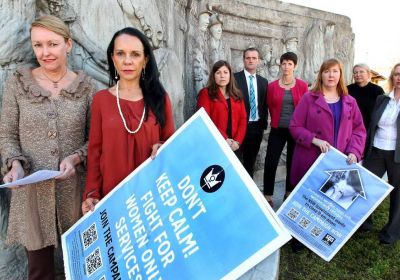 Women’s crisis shelters in New South Wales are in a state of upheaval. There are concerns that critical services are about to be shut down. In inner-Sydney there will be no women’s only, specialist refuges operating in the near future. The New South Wales government’s “Going Home Staying Home” reform plan will force at least in metropolitan Sydney 20 specialist women’s shelters to close so that more services in regional areas across the state can be opened.
Women’s crisis shelters in New South Wales are in a state of upheaval. There are concerns that critical services are about to be shut down. In inner-Sydney there will be no women’s only, specialist refuges operating in the near future. The New South Wales government’s “Going Home Staying Home” reform plan will force at least in metropolitan Sydney 20 specialist women’s shelters to close so that more services in regional areas across the state can be opened. -
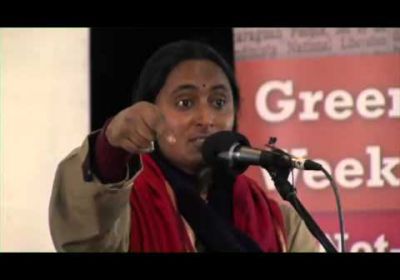
Kavita Krishnan is a socialist activist and a well-known international spokesperson for the movement against sexual violence in India.
-
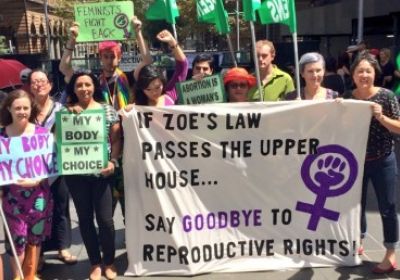 NSW Greens MP Dr Mehreen Faruqi has initiated the first abortion decriminalisation bill in New South Wales. This long overdue reform aims to remove abortion from the NSW Crimes Act of 1900. Faruqi gave notice of a motion she will move when NSW parliament resumes in the second week of August after its winter recess. “Tasmania, the ACT and Victoria have taken courageous and difficult steps to moving towards ensuring women’s reproductive rights. It is now time for New South Wales,” Faruqi said on June 19.
NSW Greens MP Dr Mehreen Faruqi has initiated the first abortion decriminalisation bill in New South Wales. This long overdue reform aims to remove abortion from the NSW Crimes Act of 1900. Faruqi gave notice of a motion she will move when NSW parliament resumes in the second week of August after its winter recess. “Tasmania, the ACT and Victoria have taken courageous and difficult steps to moving towards ensuring women’s reproductive rights. It is now time for New South Wales,” Faruqi said on June 19. -
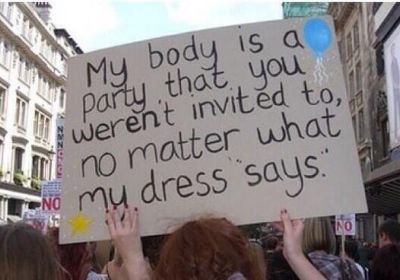 On the evening of May 23, the United States suffered another massacre of the type that has become all too familiar. Elliot Rodger, a 22-year old student at the University of California campus in Santa Barbara went on a killing spree that left seven dead, including himself. He left a video and a manifesto that made clear his motive was hatred of women.
On the evening of May 23, the United States suffered another massacre of the type that has become all too familiar. Elliot Rodger, a 22-year old student at the University of California campus in Santa Barbara went on a killing spree that left seven dead, including himself. He left a video and a manifesto that made clear his motive was hatred of women. -
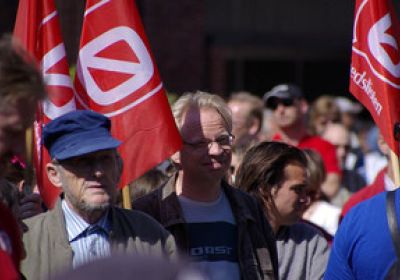 The Danish Red-Green Alliance (RGA) marked 25 years since its founding at a national conference on May 16 to 18. A radical left unity project marking 25 years in existence is itself a cause for celebration, but this conference was able to celebrate much more. After about 20 years as a fringe party in Danish politics, the RGA has recently emerged as a significant force.
The Danish Red-Green Alliance (RGA) marked 25 years since its founding at a national conference on May 16 to 18. A radical left unity project marking 25 years in existence is itself a cause for celebration, but this conference was able to celebrate much more. After about 20 years as a fringe party in Danish politics, the RGA has recently emerged as a significant force.